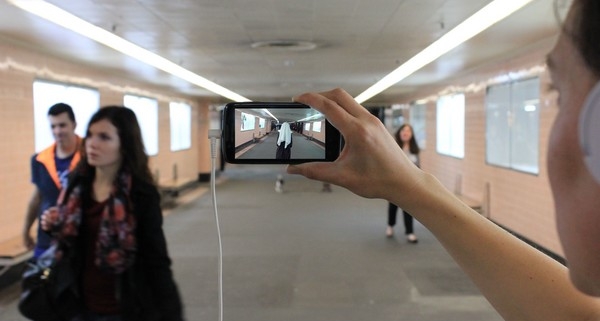One Step At A Time Like This is a four-piece, Melbourne-based theatre company, which specialises in mobile theatre. It’s a bit like a pop-up book made live: you actually become part of what’s going on (more mature folk have described it as akin to immersive cinema). Before anyone freaks out about audience participation though, this actually sounds pleasurable. It’s more about being taken on a journey, literally in fact. “I do think the word interactive can scare certain audience members away, but the way we’re participatory is quite inward,” assures Suzanne Kersten, part of the One Step At A Time Like This quartet. “The main problem around those types of words [participatory and interactive] is that some audience members think that they are going to have to perform. In our work though, they will hopefully engage, but not perform, or experience rather than be put on the spot. We like to invite people gradually to sink into the journey. It’s not about them performing in front of others.”
You start standing outside Melbourne’s Hyatt Hotel where you’ll get a call. In the next 90 minutes, you’ll wend your way through town via city institutions – the houses of religion, law and sex. It’s all of the shit polite parents tell their kids to avoid at dinner parties.
This is not Measure for Measure blow by blow (despite the fact that the work was commissioned by the Chicago Shakespeare Theater). Rather, you get some scenes on a hand held device filmed in the location to which you’ve made your way, site specific happenings, one-on-one encounters and snippets of audio as you meander through town. It’s an intriguing juxtaposition of virtual and real/audience and participant. It’s a work that’s been a long time in the making – its roots date back to 2000. One Step At A Time Like This are dedicated to the idea of long-term collaboration though – they want to give things half a chance to mature.
Kersten used to work in straight-down-the-line theatre and found being stuck in one spot stifling. Around the same time she made an ideological commitment to get closer to the audience. “We didn’t like missing out on what they thought,” she laughs. “After normal theatre shows, when the audience left, we had this sense of having missed out on something. So, while we were working with shows that had one audience at a time, we started to meet and talk with them afterwards if they were willing. If we don’t know what the audience thinks, we don’t get the most valuable feedback. It’s also an investigation in how much the audience completes the work of art. They always do it whether they’re sitting still or not, but this is shining the spotlight on their activity of engagement.
One of the other curious aspects about the show is that the audience is comprised of a crowd of two and you’re asked to respect your fellow traveller’s privacy. Another part of the show’s buzz is that you don’t know what you’re in for. “If you remove the immediate future from people, then things become readily exciting because people don’t know what’s coming next,” Kersten admits. “In a way, our lives are full of that anyway, we just think we know the outcome, but if you’re on a journey that you haven’t planned, that someone else has planned for you, it enhances the drama by not knowing where you’re going next. For this show, the drama takes place within the audience more than in front of them. It’s almost like the stage is inside them and we’re prompting that to activate, rather than putting performers in front of them. There are some live elements in Since I Suppose, but it’s not like seeing Shakespeare scenes in the city here and there. It’s not like a promenade experience. It’s a series of experiences that the audience goes through.”
One Step At A Time Like This don’t just subvert the idea of what it means to be an audience: in a time when technology can be isolating Since I Suppose turns the idea on its head. “The film is a different way of engaging with the real world around you. Because the scenes are shot in the same location in which audience is in, it’s like viewing the real world side-by-side with the virtual world, albeit one which was shot in the recent past. It’s maintaining a relationship between the virtual and the real. You flit from one to the other.”
Another beauty of this work is that it opens up time, which is a goddamn luxury these days. “We’re presenting opportunities to reflect or giving people time to focus on things. Just giving people some time is a significant thing to do. With Since I Suppose you’ve got the time to reflect on whatever the narrative prompts – capital punishment, corrupt politics, relationship to the afterlife (if in fact you have one) – all of these things are in the Measure For Measure narrative. Because people are moving through real life locations, it prompts their own inner narrative around these issues.”
BY MEG CRAWFORD







